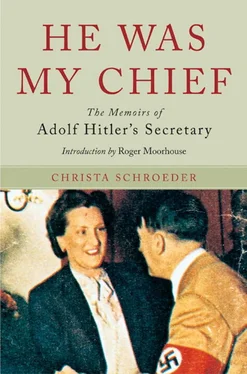Christa Schroeder - He Was My Chief - The Memoirs of Adolf Hitler's Secretary
Здесь есть возможность читать онлайн «Christa Schroeder - He Was My Chief - The Memoirs of Adolf Hitler's Secretary» весь текст электронной книги совершенно бесплатно (целиком полную версию без сокращений). В некоторых случаях можно слушать аудио, скачать через торрент в формате fb2 и присутствует краткое содержание. Город: Barnsley, Год выпуска: 2012, ISBN: 2012, Издательство: Frontline Books, Жанр: История, Биографии и Мемуары, на английском языке. Описание произведения, (предисловие) а так же отзывы посетителей доступны на портале библиотеки ЛибКат.
- Название:He Was My Chief: The Memoirs of Adolf Hitler's Secretary
- Автор:
- Издательство:Frontline Books
- Жанр:
- Год:2012
- Город:Barnsley
- ISBN:978-1-7830-3064-4
- Рейтинг книги:4 / 5. Голосов: 1
-
Избранное:Добавить в избранное
- Отзывы:
-
Ваша оценка:
- 80
- 1
- 2
- 3
- 4
- 5
He Was My Chief: The Memoirs of Adolf Hitler's Secretary: краткое содержание, описание и аннотация
Предлагаем к чтению аннотацию, описание, краткое содержание или предисловие (зависит от того, что написал сам автор книги «He Was My Chief: The Memoirs of Adolf Hitler's Secretary»). Если вы не нашли необходимую информацию о книге — напишите в комментариях, мы постараемся отыскать её.
He Was My Chief: The Memoirs of Adolf Hitler's Secretary — читать онлайн бесплатно полную книгу (весь текст) целиком
Ниже представлен текст книги, разбитый по страницам. Система сохранения места последней прочитанной страницы, позволяет с удобством читать онлайн бесплатно книгу «He Was My Chief: The Memoirs of Adolf Hitler's Secretary», без необходимости каждый раз заново искать на чём Вы остановились. Поставьте закладку, и сможете в любой момент перейти на страницу, на которой закончили чтение.
Интервал:
Закладка:
Letter, FHQ Wolfsschanze, 28 July 1941:
The last few days I have been miserable again. It is a thorn in the side of certain people that even in wartime the boss has his personal staff around him which obviously includes two females. An orderly told me about comments made at a late hour after excessive drinking in the officers’ mess and which have incensed me. At first I was going to take it up with the boss, for it is really a mutiny against him, a criticism of his directives and orders. We are not here from choice but only because the boss wants it and maintains that he can only work with us. He has emphasised more than once in the presence of these gentlemen that without us (Dara and me) he would have been in a pickle. Thus I find it arrogant and stupid of these officers to deprecate our presence.
I am exercising an iron reserve towards the parties involved and now they have a bad conscience. Probably it was not a pleasant situation for them when, just a few days after the comment, the boss asked the Wehrmacht adjutant if a tent was available for his ladies at the next HQ. Receiving the answer ‘No!’, in indignation the Führer ordered that a possibility for our accommodation had to be created immediately◦– yes, they had been thinking it would be just a short stay for a few days under canvas and we would not be needed. In all these excuses one sees their hope of ditching us by the wayside. But the boss would not let himself be persuaded. A coach will have to be provided for our beds and work, he said.
Earlier when I drank with them I laboured under the delusion that these people were friends, but now I see that the chats we had in those hours were not the outpourings of comradely sentiment but just the effect of the damned alcohol. These social periods changed nothing and created no friendships. The day after, I came across more hostility. Why such deception? It is a bitter fact to realise that one is abandoned and alone and that with the best will in the world and with the purest intentions no friendship is possible.
The men are all obsessed with one thing, to seize the best possible advantage for themselves and appear in the best light. They all want to be more than they are and do not realise how silly they look to those who see through them. The most ridiculous thing is when the boss is standing amongst some of these gentlemen and the photographer picks up his Leica. Then they all come streaming to the boss like moths to the lamp, just to get into the picture. This morbid need to be noticed is simply disgusting. Well, now I have had a good moan. But you can understand how this hollow society revolts me and therefore I had to let off steam again.
Letter, FHQ Wolfsschanze 20 August 1941:
Life has become rather monotonous. We have been here nine weeks already and we gather that we will be staying here until the end of October. That is really a wretchedly long time, little work, often nothing to do all day, always the same faces, the same conversations. I am so sick of this being condemned to inactivity that recently I attempted to convince the boss that he really needs only one secretary, for I kept the shop alone for years. But he stopped me at once, preventing me from making my point that I should spend the war employed usefully somewhere◦– either in a hospital or an armaments factory. Yes, I have no choice but to soldier on here.
A few days ago we saw a British newsreel which came from the United States. It showed the awful devastation caused to whole sections of streets in London. All the warehouses, the Parliament, etc. have been destroyed. Wandering over whole districts of the city, the camera showed the enormous fires, warehouse after warehouse a sea of flames. The commentary said that the British could take it because they knew that Berlin looked the same. If the poor British only knew that the damage they inflict on Berlin is a mere pinprick compared to London, I am sure they would not want to carry on. Captured British officers say themselves that their own government is acting irresponsibly. If the British◦– and moreover their officers◦– admit it, we can hope for the best to happen. I would like nothing better than that the British should sue for peace once we have disposed of Russia. The war with Britain can only lead to each of us reducing the cities of the other to rubble. And Mr Roosevelt laughs and looks forward to his British inheritance. It is really incomprehensible to me that the British do not see sense. After we have extended eastwards we do not need their colonies. I would find it much more practical if we worked together. The Ukraine and Crimea are so fertile, we can grow everything we need there and barter for the rest (coffee, tea, cocoa, etc.) with the South Americans. It is so clear and simple. I pray to God that the British soon see reason.
Letter, FHQ Wolfsschanze, 30 August 1941:
…we spent a couple of days in Galicia and I found your letter on my return… Our stay here at HQ is dragging on and on. At first we thought we would be back in Berlin at the end of July, then it was mid October and now people are saying we will not be getting away before the end of October or perhaps even later. A perceptible autumn chill is already in the air and if the boss decides to stay for the winter we shall all freeze. This ‘living for ever in the bunker’ is healthy for none of us. The boss does not look at all well, he gets too little fresh air and is now oversensitive to sun and wind whenever he goes for a few hours’ drive.
I would love to have remained in Galicia, [77] During a visit to the Eastern Front, Hitler and Mussolini spent the night of 27 August 1941 on their special trains at FHQ Askania-Süd, a purpose-built surface tunnel to house the train coaches near the village of Frysztak in Galicia (tunnel and other structures remain in existence). Barracks for the security personnel and a tea-house for Hitler were located near Strzyzow, twenty kilometres north of Krosno. Seidler and Zeigert, Die Führer-Hauptquartiere , pp. 218–21. (TN)
nearly everybody was in favour of it, but it is more difficult to guarantee security there. Incidents occur every day, and as the compound there cannot be fenced off as well as at our present HQ the danger is too great.
The countryside there is so lovely it really surprised me. On one side forests and on the other gently rolling hills. On the hilltops cattle were silhouetted against the blue sky and the farmers followed the plough. The peasants’ huts are quite romantic, rounded and protected against the wind by a thatched roof and scarcely a window anywhere. In front a well with a rusty chain, a few sunflowers; the womenfolk, suntanned and all barefoot, wear a long dark cloth over the head and down to the hips. They keep close to their cows, a little shady, a little secretive, but totally in keeping with the landscape, which somehow reminded me of home.
That whole region there is freer; here in the woods the atmosphere is depressing after a while. Another thing that struck me there was that I did not have the feeling of being locked in, I could see the farmers working in the fields and this gave me the feeling of being free while here we are always coming across sentries and having to show our identity cards. Even so, of course, we remain perpetually isolated from the world wherever we are: in Berlin, on the Berg or travelling, always the same limited circle, always the same crowd inside the wire. And therein lies the danger of becoming shy of people and losing contact with real life and… a great dilemma: one longs to get out, but when one is out one does not know where to begin because one is so utterly and completely set in this fixed existence and no possibility exists for a life beyond this circle. The circle around the boss is held together by the common experience, but woebetide us when he goes away, for then everything comes apart (this is also the opinion of Dr Brandt), and then it is grim for those who have lost contact with the outside world. Excuse me for going on about this, but I see in it a problem for later which will not be easy to resolve.
Читать дальшеИнтервал:
Закладка:
Похожие книги на «He Was My Chief: The Memoirs of Adolf Hitler's Secretary»
Представляем Вашему вниманию похожие книги на «He Was My Chief: The Memoirs of Adolf Hitler's Secretary» списком для выбора. Мы отобрали схожую по названию и смыслу литературу в надежде предоставить читателям больше вариантов отыскать новые, интересные, ещё непрочитанные произведения.
Обсуждение, отзывы о книге «He Was My Chief: The Memoirs of Adolf Hitler's Secretary» и просто собственные мнения читателей. Оставьте ваши комментарии, напишите, что Вы думаете о произведении, его смысле или главных героях. Укажите что конкретно понравилось, а что нет, и почему Вы так считаете.












